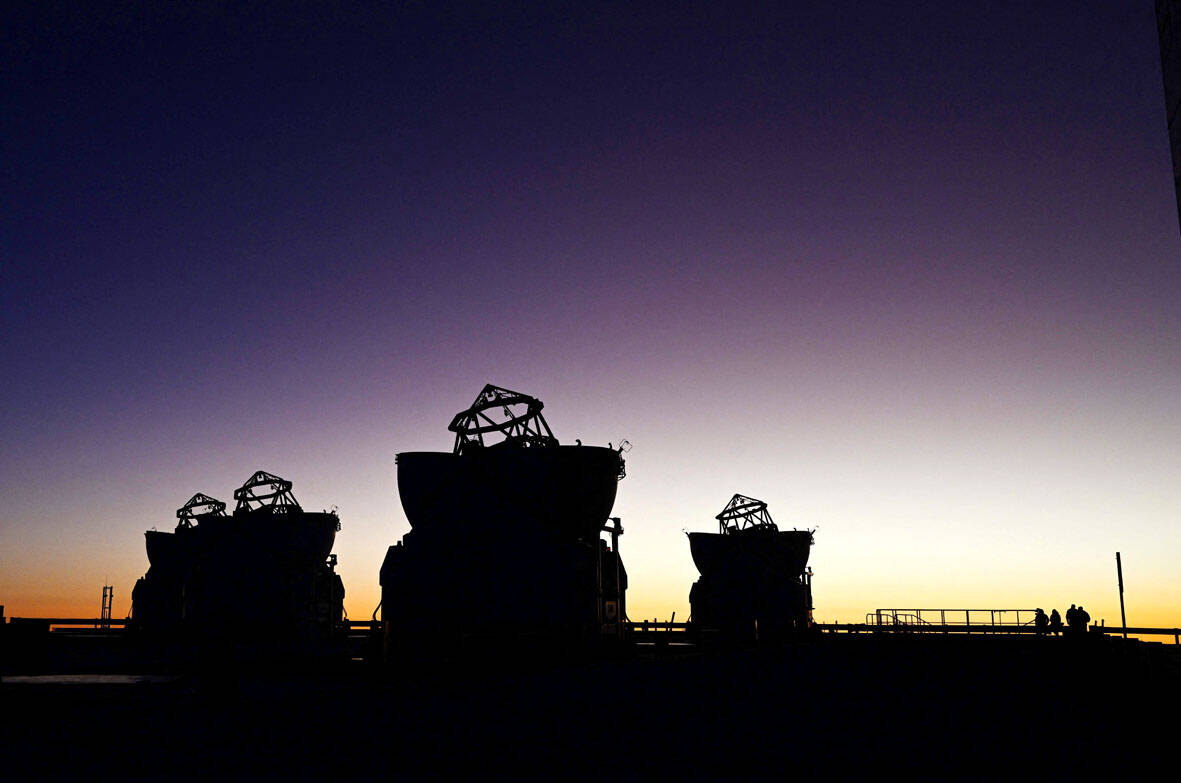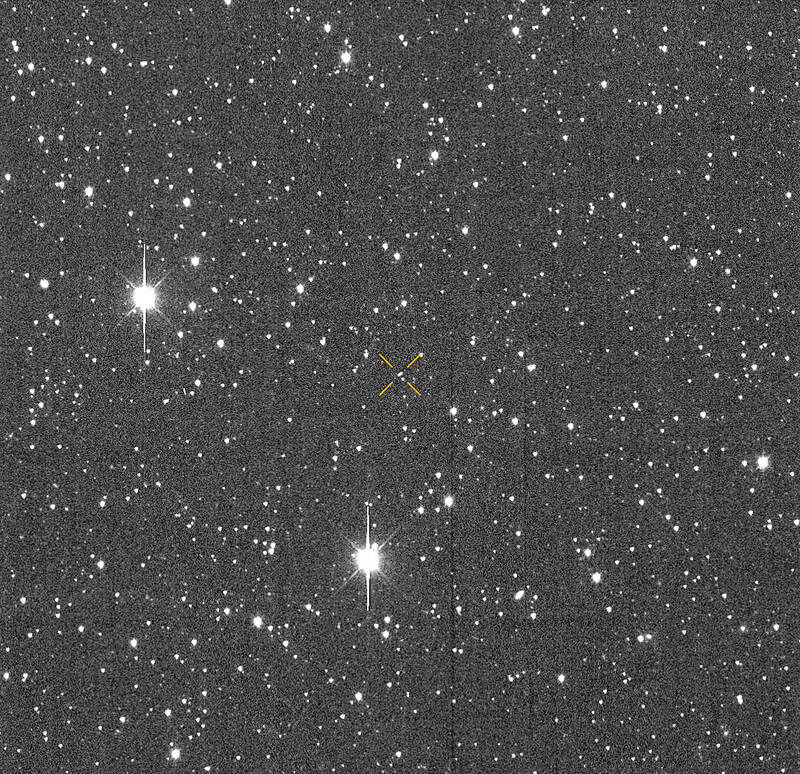China has begun recruiting for a planetary defense force after risk assessments determined that an asteroid could conceivably hit Earth in 2032.
Job ads posted online by China’s State Administration of Science, Technology and Industry for National Defence (SASTIND) this week, sought young loyal graduates focused on aerospace engineering, international cooperation and asteroid detection.
The recruitment drive comes amid increasing focus on an asteroid with a low — but growing — likelihood of hitting earth in seven years. The 2024 YR4 asteroid is at the top of the European and US space agencies’ risk lists, and last week analysts increased their probability assessment of it hitting Earth from 1.3 percent to 2.2 percent. The UN’s Space Mission Planning Advisory Group, comprising countries with space programs including China, have been meeting regularly to discuss a response.

Photo: Reuters
The ads, posted to WeChat earlier this week, listed 16 job vacancies at SASTIND, including three for a new “planetary defense force.” They invited applications from recent graduates aged under 35, with professional and technical qualifications and “a firm political stance” supporting the Chinese Communist party and an ideology aligned with its leader, Xi Jinping (習近平).
The ads prompted widespread online discussion among young people — a demographic that saw unemployment rates reach a record high in 2023.
“The Earth would depend on you three. Isn’t that stressful?” asked one person.

Photo: AFP
“If you succeed, you’re a hero who saves the world,” said another popular comment on Weibo. “But no one would punish you for failing, I mean, there be literally ‘no one’ left.”
Job descriptions attached to the ads suggest the force will have a key focus on international cooperation, and on designing systems for new and experimental technology. The planetary defense force jobs are described as “research on monitoring and early warning of near-Earth asteroids,” and required graduates with a masters degree or higher, with majors in astrophysics, earth and space exploration technology and aerospace science and technology.
China’s aerospace sector is advancing, and it’s not clear the recruitment has been specifically prompted by the discovery of the asteroid. SASTIND did not respond to requests for comment.

Photo: AP
Andrew Jones, a correspondent at SpaceNews specializing in China’s sector, said the timing of recruitment appeared to be coincidental with the discovery of 2024 YR4, and the jobs were likely “supplemental to China’s already established efforts to develop its planetary defense capabilities.”
“This includes monitoring and warning systems, both on the ground and potentially in space, and preparing to test measures such as kinetic impactors to alter the orbits of threatening asteroids.”
Deflecting an asteroid like 2024 YR4 appears to be a key focus of China’s aerospace development, including plans to replicate the 2020 Double Asteroid Redirection Test (Dart), conducted by NASA. The Dart involved crashing a spacecraft into a 160-meter-long asteroid named Dimorphos, successfully diverting its trajectory for the first time. The European Space Agency later launched another spacecraft to observe and report on the impact the Dart had on Dimorphos.
China is also preparing its own asteroid-redirection test, on a smaller asteroid named 2015 XF261, in 2027. But Harrison Agrusa, a planetary scientist at the Observatoire del la Cote d’Azur said there are concerns about the smaller size of the asteroid China is targeting.
“Given what we learned from Dart, a similar impactor mission onto a much smaller target would likely fully disrupt it,” he said. “This may not be the most useful mitigation strategy, as you can potentially create an even bigger problem by turning a single projectile (with a known trajectory) into many fragments (with unknown trajectories).”
Harrison said there was no need to be overly alarmed about 2024 YR4, noting that multiple countries and aerospace organizations were working together on it.
“We know we have the capability to deflect an asteroid like this, as demonstrated by the Dart mission. So this asteroid doesn’t need to be feared, it just needs to be studied and understood.”

Three big changes have transformed the landscape of Taiwan’s local patronage factions: Increasing Democratic Progressive Party (DPP) involvement, rising new factions and the Chinese Nationalist Party’s (KMT) significantly weakened control. GREEN FACTIONS It is said that “south of the Zhuoshui River (濁水溪), there is no blue-green divide,” meaning that from Yunlin County south there is no difference between KMT and DPP politicians. This is not always true, but there is more than a grain of truth to it. Traditionally, DPP factions are viewed as national entities, with their primary function to secure plum positions in the party and government. This is not unusual

Mongolian influencer Anudari Daarya looks effortlessly glamorous and carefree in her social media posts — but the classically trained pianist’s road to acceptance as a transgender artist has been anything but easy. She is one of a growing number of Mongolian LGBTQ youth challenging stereotypes and fighting for acceptance through media representation in the socially conservative country. LGBTQ Mongolians often hide their identities from their employers and colleagues for fear of discrimination, with a survey by the non-profit LGBT Centre Mongolia showing that only 20 percent of people felt comfortable coming out at work. Daarya, 25, said she has faced discrimination since she

More than 75 years after the publication of Nineteen Eighty-Four, the Orwellian phrase “Big Brother is watching you” has become so familiar to most of the Taiwanese public that even those who haven’t read the novel recognize it. That phrase has now been given a new look by amateur translator Tsiu Ing-sing (周盈成), who recently completed the first full Taiwanese translation of George Orwell’s dystopian classic. Tsiu — who completed the nearly 160,000-word project in his spare time over four years — said his goal was to “prove it possible” that foreign literature could be rendered in Taiwanese. The translation is part of

April 21 to April 27 Hsieh Er’s (謝娥) political fortunes were rising fast after she got out of jail and joined the Chinese Nationalist Party (KMT) in December 1945. Not only did she hold key positions in various committees, she was elected the only woman on the Taipei City Council and headed to Nanjing in 1946 as the sole Taiwanese female representative to the National Constituent Assembly. With the support of first lady Soong May-ling (宋美齡), she started the Taipei Women’s Association and Taiwan Provincial Women’s Association, where she